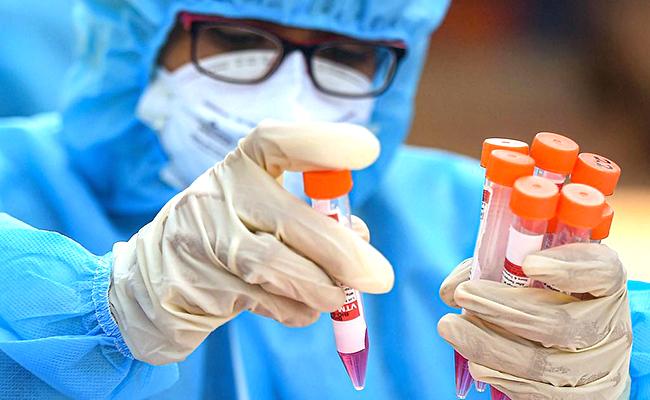
The overall COVID-19 situation in the country is stabilising and the government will work towards ensuring further improvement, NITI Aayog member VK Paul said on Saturday.
At a media briefing by the Health Ministry, its Joint Secretary Lav Agarwal said a decline in the active cases has been observed since the last 12 days. On May 3, the active cases were 17.13 per cent of the total caseload, which has declined to 15.1 per cent and recovered cases stand at 83.8 per cent.
He said the overall positivity rate is less than 20 per cent since the last five days and there is a trend of plateauing and decreasing of cases.
"It is evident that we can see a certain amount of stabilisation of the second wave of the pandemic. Some states have shown a clear pattern, in some states there are concerns and in some others there is a trend towards an increase. It is a mixed picture.
"But overall, the situation is stabilising and we hope and we will work towards ensuring further stabilisation and rapid decline of this pandemic," Mr Paul said.
The deadly second wave of coronavirus wreaked havoc in several parts of the country, with some days clocking over 4 lakh daily coronavirus cases and fatalities more than 4,000.
Mr Paul said in the second wave, India had nearly 40 lakh active cases and the figure has now gone down to around 36-37 lakh active cases. He said there have been recoveries and case fatality rate has been stable which is a "big achievement".
"Much more can be done and should be done. The rate of stabilisation and early decline is higher than the first wave," Mr Paul said.
He pointed out that by mid-February, India was conducting some 5-6 lakh tests.
But when the numbers started rising that needed increased testing, it did not go down or stabilise because the country had infrastructure and supplies and tests were ramped up to 18 lakh tests a day.
"This shows testing increased in response (to the rising cases). On one of the days, testing was ramped up to 19 lakh tests. A mix of RTPCR and Rapid Antigen did not decline," he said.
He said no other country has done 19 lakh tests a day which he claimed is a world record.
Mr Agarwal said 10 states account for 85 per cent of the total coronavirus cases in the country. He said 11 states have over one lakh active COVID-19 cases, 17 have less than 50,000 cases while eight have active cases between 50,000 and one lakh.
Maharashtra, Karnataka, Kerala, Uttar Pradesh, Rajasthan, Delhi, Haryana, Bihar, Gujarat, Telangana, Goa and Chhattisgarh, which are recording a high number of novel coronavirus cases, are also reporting decline in the number of active cases, Mr Agarwal pointed out.
However, Tamil Nadu, Andhra Pradesh, West Bengal, Odisha, Punjab, Assam, Himachal Pradesh and Puducherry are witnessing a trend of continued increase in daily new cases, he said.
Twenty-four states have a COVID-19 positivity rate of more than 15 per cent while Delhi, Chhattisgarh, Daman and Diu, Haryana and Madhya Pradesh have reported a major drop in case positivity, Mr Agarwal said.
India in a day recorded 3,26,098 COVID-19 cases that took the tally to 2,43,72,907, while 3,890 new fatalities pushed the death count to 2,66,207, according to Union Health Ministry data updated on Saturday.
The active cases have reduced to 36,73,802 and comprise 15.07 per cent of the total infections, while the national COVID-19 recovery rate has improved to 83.83 per cent, it stated.
Agarwal said a total of 18.04 crore vaccine doses have been administered so far in the country. This includes 13.74 crore people above the age of 45 years, 1.62 crore healthcare workers, 2.25 crore frontline workers and 42.59 lakh people between the age of 18-44 years who have received their first dose.
Mr Agarwal also said the containment efforts of the government are working and the overall COVID-19 positivity rate in India, which stood at 21.9 per cent last week, has now fallen to 19.8 per cent.
He also spoke of "e-Sanjeevani OPD" which is a telemedicine platform that facilitates free online medical consultation to all citizens of India, as well as provides for online prescription of medicines.
He said this "Stay Home OPD" is operational in 28 states and has so far provided over 30,000 consultations by more than 17,000 doctors.
AIIMS Director Randeep Guleria also warned against the spread of mucormycosis and recommended that with COVID-19 cases increasing, it's of paramount importance that protocols of infection control practices are followed at hospitals.
"It has been seen that secondary infections like fungal and bacterial are causing more mortality," Dr Guleria said.
The black fungus infection, also known as mucormycosis, is caused by a fungus called mucor.
Recently, several states have flagged cases of COVID-triggered mucormycosis, especially among patients who are diabetic.
In an advisory released on May 9, the Centre said mucormycosis may turn fatal if uncared for. It also said the fungal infection mainly affects people who are on medication that reduces their ability to fight environmental pathogens.













